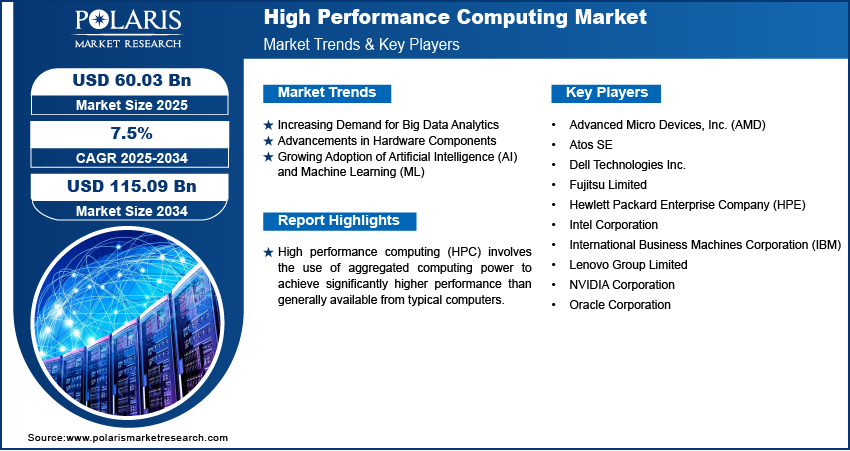Asia-Pacific Emerges as Fastest-Growing Region in High Performance Computing Market

The global High Performance Computing (HPC) market is experiencing unprecedented growth, driven by the escalating demands of artificial intelligence (AI), big data analytics, and sovereign digital infrastructure initiatives. As nations prioritize technological self-reliance and digital transformation, HPC systems have become pivotal in sectors ranging from healthcare and climate modeling to defense and advanced manufacturing.
The high performance computing (HPC) market size was valued at USD 55.97 billion in 2024. It is projected to grow from USD 60.03 billion in 2025 to USD 115.09 billion by 2034, exhibiting a CAGR of 7.5% during 2025–2034.
Market Overview
High Performance Computing refers to the aggregation of computing power to deliver higher performance than typical desktop computers or workstations. HPC systems are essential for solving complex computational problems, enabling simulations, and processing vast datasets at high speeds. The integration of HPC with AI and machine learning (ML) has further expanded its applications, making it indispensable for modern scientific and industrial advancements.
Global Market Trends
- Integration with AI and ML: The convergence of HPC with AI and ML is revolutionizing data processing capabilities. HPC systems provide the necessary infrastructure to train complex AI models, leading to advancements in natural language processing, autonomous vehicles, and predictive analytics.
- Sovereign Digital Infrastructure: Countries are increasingly investing in their own HPC infrastructures to ensure data sovereignty and reduce reliance on foreign technologies. This trend is evident in the development of national supercomputing centers and indigenous processor initiatives.
- Cloud-Based HPC Solutions: The adoption of cloud computing has made HPC more accessible to organizations of all sizes. Cloud-based HPC offers scalability and cost-effectiveness, enabling businesses to leverage high computational power without significant capital investment.
- Energy Efficiency and Sustainability: With growing environmental concerns, there is a push towards developing energy-efficient HPC systems. Innovations in cooling technologies and processor designs are aimed at reducing the carbon footprint of data centers.
Country-Wise Analysis
United States
The U.S. continues to lead in HPC innovation, with significant investments from both the government and private sectors. The Department of Energy's Exascale Computing Project exemplifies the nation's commitment to advancing computational capabilities. HPC systems are integral in various domains, including climate research, defense simulations, and pharmaceutical development. The integration of HPC with AI and ML has further solidified the U.S.'s position at the forefront of technological advancements.
China
China has made substantial strides in HPC, focusing on developing indigenous technologies to achieve self-reliance. The country's emphasis on AI and big data analytics has spurred investments in HPC infrastructure. China's supercomputing capabilities are leveraged across sectors such as weather forecasting, genomics, and national security. The government's support for HPC initiatives underscores its strategic importance in China's technological roadmap.
Read More @ https://www.polarismarketresearch.com/industry-analysis/high-performance-computing-market
India
India is emerging as a significant player in the HPC landscape. The government's IndiaAI Mission aims to develop native AI solutions supported by robust computing infrastructure. With plans to expand its data center capacity significantly, India is focusing on enhancing its digital infrastructure to support HPC applications in healthcare, agriculture, and education. The integration of HPC with AI is expected to drive innovation and economic growth in the country.
European Union
The EU is investing heavily in HPC to bolster its digital sovereignty. Initiatives like the European Processor Initiative aim to develop indigenous processors for supercomputers, reducing dependence on non-European technologies. The EU's commitment to building AI gigafactories and data centers reflects its strategy to become a global leader in HPC and AI. These efforts are crucial for supporting research, industrial competitiveness, and addressing societal challenges.
Japan
Japan's HPC capabilities are exemplified by its development of the Fugaku supercomputer, which has been instrumental in research areas such as drug discovery and disaster prevention. The country's focus on energy-efficient computing and integration of HPC with AI technologies positions it as a leader in sustainable high-performance computing solutions.
South Korea
South Korea is advancing its HPC infrastructure to support its strong electronics and automotive industries. Investments in supercomputing facilities are aimed at enhancing research and development capabilities, particularly in AI and big data analytics. The government's support for HPC initiatives is aligned with its broader strategy to foster innovation and technological advancement.
Brazil
Brazil is investing in HPC to support its scientific research and industrial sectors. The country's focus on climate modeling, oil exploration, and bioinformatics has driven the demand for high-performance computing resources. Government initiatives aim to expand HPC infrastructure to support national development goals.
United Arab Emirates
The UAE is leveraging HPC to drive its digital transformation agenda. Investments in AI and data analytics are supported by the development of HPC infrastructure, facilitating advancements in sectors like healthcare, finance, and energy. The country's strategic focus on technology and innovation underscores the importance of HPC in achieving its vision for a knowledge-based economy.
Conclusion
The global High Performance Computing market is at a pivotal juncture, with technological advancements and strategic investments shaping its trajectory. The integration of HPC with AI and ML is unlocking new possibilities across various sectors, while national initiatives underscore the importance of digital sovereignty. As countries continue to invest in HPC infrastructure, the market is poised for sustained growth, driving innovation and addressing complex global challenges.
More Trending Latest Reports By Polaris Market Research:
Intelligent Traffic Management System Market
Customer Relationship Management Market
Catalog Management System Market
DDoS Protection and Mitigation Security Market
Liquid Filling Machines Market
Contact Center Softwtare Market
Virtual Payment (POS) Terminals Market
- Art
- Causes
- Crafts
- Dance
- Drinks
- Film
- Fitness
- Food
- Jogos
- Gardening
- Health
- Início
- Literature
- Music
- Networking
- Outro
- Party
- Religion
- Shopping
- Sports
- Theater
- Wellness
- Travels

